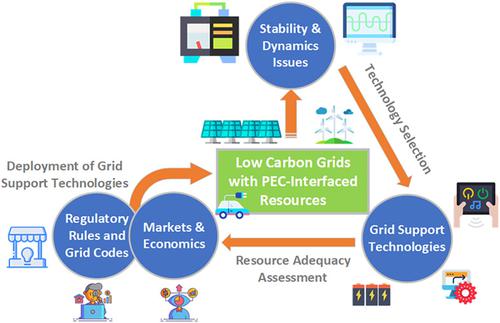当前位置:
X-MOL 学术
›
WIREs Energy Environ.
›
论文详情
Our official English website, www.x-mol.net, welcomes your feedback! (Note: you will need to create a separate account there.)
Power system stability in the transition to a low carbon grid: A techno-economic perspective on challenges and opportunities
Wiley Interdisciplinary Reviews: Energy and Environment ( IF 6.1 ) Pub Date : 2021-04-05 , DOI: 10.1002/wene.399 Lasantha Meegahapola 1 , Pierluigi Mancarella 2, 3 , Damian Flynn 4 , Rodrigo Moreno 5, 6, 7
Wiley Interdisciplinary Reviews: Energy and Environment ( IF 6.1 ) Pub Date : 2021-04-05 , DOI: 10.1002/wene.399 Lasantha Meegahapola 1 , Pierluigi Mancarella 2, 3 , Damian Flynn 4 , Rodrigo Moreno 5, 6, 7
Affiliation

|
Increasing power system stability challenges are being witnessed worldwide, while transitioning toward low-carbon grids with a high-share of power electronic converter (PEC)-interfaced renewable energy sources (RESs) and distributed energy resources (DERs). Concurrently, new technologies and operational strategies are being implemented or proposed to tackle these challenges. Since electricity grids are deregulated in many jurisdictions, such technologies need to be integrated within a market framework, which is often a challenge in itself due to inevitable regulatory delays in updating grid codes and market rules. It is also highly desirable to ensure that an economically feasible optimal technology mix is integrated in the power system, without imposing additional burdens on electricity consumers. This article provides a comprehensive overview of emerging power system stability challenges posed by PEC-interfaced RES and DER, particularly related to low inertia and low system strength conditions, while also introducing new technologies that can help tackle these challenges and discussing the need for suitable techno-economic considerations to integrate them into system and market operation. As a key point, the importance of recognizing the complexity of system services to guarantee stability in low-carbon grids is emphasized, along with the need to carefully integrate new grid codes and market mechanisms in order to exploit the full benefits of emerging technologies in the transition toward ultra-low carbon futures.
中文翻译:

低碳电网转型中的电力系统稳定性:挑战和机遇的技术经济视角
全世界都在目睹越来越多的电力系统稳定性挑战,同时向具有高份额电力电子转换器 (PEC) 接口的可再生能源 (RES) 和分布式能源 (DER) 的低碳电网过渡。与此同时,正在实施或提出新技术和运营战略来应对这些挑战。由于在许多司法管辖区取消了对电网的管制,因此需要将此类技术整合到市场框架内,由于更新电网规范和市场规则时不可避免的监管延迟,这本身通常是一个挑战。还非常希望确保将经济上可行的最佳技术组合集成到电力系统中,而不会给电力消费者带来额外的负担。本文全面概述了 PEC 接口 RES 和 DER 带来的新兴电力系统稳定性挑战,尤其是与低惯性和低系统强度条件相关的挑战,同时还介绍了有助于应对这些挑战的新技术,并讨论了对合适技术的需求——将其纳入制度和市场运作的经济考虑。作为一个关键点,强调认识到系统服务的复杂性以保证低碳电网的稳定性的重要性,同时需要仔细整合新的电网规范和市场机制,以充分利用新兴技术在低碳电网中的优势。向超低碳期货过渡。尤其与低惯性和低系统强度条件相关,同时还引入了有助于应对这些挑战的新技术,并讨论了将它们整合到系统和市场运营中的适当技术经济考虑的必要性。作为一个关键点,强调认识到系统服务的复杂性以保证低碳电网的稳定性的重要性,同时需要仔细整合新的电网规范和市场机制,以充分利用新兴技术在低碳电网中的优势。向超低碳期货过渡。尤其与低惯性和低系统强度条件相关,同时还引入了有助于应对这些挑战的新技术,并讨论了将它们整合到系统和市场运营中的适当技术经济考虑的必要性。作为一个关键点,强调认识到系统服务的复杂性以保证低碳电网的稳定性的重要性,同时需要仔细整合新的电网规范和市场机制,以充分利用新兴技术在低碳电网中的优势。向超低碳期货过渡。
更新日期:2021-04-05
中文翻译:

低碳电网转型中的电力系统稳定性:挑战和机遇的技术经济视角
全世界都在目睹越来越多的电力系统稳定性挑战,同时向具有高份额电力电子转换器 (PEC) 接口的可再生能源 (RES) 和分布式能源 (DER) 的低碳电网过渡。与此同时,正在实施或提出新技术和运营战略来应对这些挑战。由于在许多司法管辖区取消了对电网的管制,因此需要将此类技术整合到市场框架内,由于更新电网规范和市场规则时不可避免的监管延迟,这本身通常是一个挑战。还非常希望确保将经济上可行的最佳技术组合集成到电力系统中,而不会给电力消费者带来额外的负担。本文全面概述了 PEC 接口 RES 和 DER 带来的新兴电力系统稳定性挑战,尤其是与低惯性和低系统强度条件相关的挑战,同时还介绍了有助于应对这些挑战的新技术,并讨论了对合适技术的需求——将其纳入制度和市场运作的经济考虑。作为一个关键点,强调认识到系统服务的复杂性以保证低碳电网的稳定性的重要性,同时需要仔细整合新的电网规范和市场机制,以充分利用新兴技术在低碳电网中的优势。向超低碳期货过渡。尤其与低惯性和低系统强度条件相关,同时还引入了有助于应对这些挑战的新技术,并讨论了将它们整合到系统和市场运营中的适当技术经济考虑的必要性。作为一个关键点,强调认识到系统服务的复杂性以保证低碳电网的稳定性的重要性,同时需要仔细整合新的电网规范和市场机制,以充分利用新兴技术在低碳电网中的优势。向超低碳期货过渡。尤其与低惯性和低系统强度条件相关,同时还引入了有助于应对这些挑战的新技术,并讨论了将它们整合到系统和市场运营中的适当技术经济考虑的必要性。作为一个关键点,强调认识到系统服务的复杂性以保证低碳电网的稳定性的重要性,同时需要仔细整合新的电网规范和市场机制,以充分利用新兴技术在低碳电网中的优势。向超低碳期货过渡。


























 京公网安备 11010802027423号
京公网安备 11010802027423号